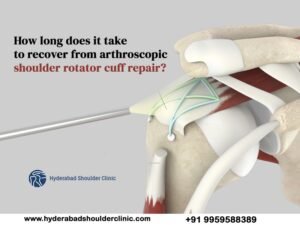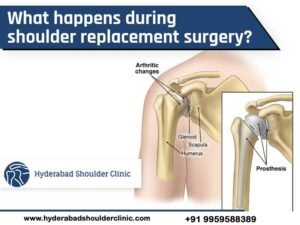Shoulder replacement is one of the fastest-growing joint replacements, similar to the well-known knee and hip replacement. Shoulder replacement surgery has been a safe and effective surgery to alleviate pain and deterioration due to age, arthritis and shoulder fractures. Shoulder replacement surgery has been around since the ’50s to treat severe shoulder fractures. Off late, its popularity is rising due to its success in treating other painful conditions, including severe rotator injuries.

Conditions under which shoulder replacement surgery is worth it
No shoulder expert will suggest shoulder replacement as the first line of treatment. All shoulder complications are initially treated via non-surgical treatment options like medications, therapy and steroid injections. At present, surgeons are opting for shoulder replacement to treat the following conditions:
Age-related arthritis: This type of arthritis is often seen in individuals over 50. From everyday wear and tear, the cartilage that cushions the bones wears away, and the bones eventually rub together. The rubbing results in pain and stiffness and limits joint mobility.
Rheumatoid arthritis (RA): RA is an autoimmune and inflammatory disease where the body’s immune system attacks healthy cells by mistake, causing painful swelling (inflammation) in the affected parts of the body. The main target areas of RA are the joints. Multiple joints could be affected by RA. The patient experiences bone damage, pain, stiffness and loss of cartilage over time, usually many joints at once.
Shoulder bone damage: When severe damage such as shattering occurs to any one of the three shoulder bones—the upper arm bone (humerus), shoulder blade (scapula) and collarbone (clavicle). A shattered bone is hard to be pieced together, and ensuring the blood supply isn’t disrupted is difficult.
Muscle tears: A rotator cuff is a group of muscles and tendons around the shoulder joint. The rotator cuff provides stability and support and helps in various ranges of motion. A tear or injury to any of these rotator cuff parts leads to pain and degenerative arthritis over time.

What happens in a Shoulder replacement surgery?
The anatomical structure of the shoulder joint is that it is a ball and socket joint. The round-shaped bone moves within the groove of another bone. This anatomical arrangement provides greater flexibility and freedom of movement.
In a shoulder replacement surgery, the damaged parts of the shoulder and replaced with artificial parts. Shoulder replacement could be done partially where only the upper arm bone’s head (or ball) is replaced, or total replacement of both the ball and the socket is done.
For whom is shoulder replacement surgery worth it?
If one has difficulty doing the activities mentioned below, consult a shoulder expert like Dr Chandra Sekhar. After careful examination and diagnosis, an experienced surgeon might recommend shoulder replacement surgery. Diagnosis includes going through your medical history, general health check-up, X-rays to know the areas of damage to the shoulder, and tests to verify the condition of soft tissues.
Ask yourself:
- Is the pain interfering with your ability to function and perform everyday tasks like driving, dressing, cooking, showering and cleaning?
- Is the shoulder paining even in resting positions or while sleeping?
- What is the range of motion you can do with the shoulder? Is there reduced flexibility in shoulder-related activities?
- Is the pain-reducing after using anti-inflammatory medications, cortisone injections or physical therapy?
In all the above scenarios, the surgeon might suggest shoulder replacement surgery to alleviate pain and improve the quality of life.
Prepare yourself for shoulder replacement surgery.
A couple of weeks before the surgery, the patient is asked to stop blood thinning medications as they make blood clotting difficult.
- Immuno-suppressants such as steroids and other medications are stopped.
- Eliminate or cut down on the use of tobacco products since Nicotine healing.
- If the patient has diabetes, heart disease, or other medical condition, they should regulate them and keep them in check.
- Alcohol use affects how the body adapts to anaesthesia, so consumption of alcohol should be limited.
- Any minor health ailments, such as cold, flu, fever, herpes breakout, etc., should be disclosed in the days preceding surgery.
Dr Chandrashekar explains that shoulder replacement is a rapidly growing treatment option for shoulder-related issues. He will carefully assess your condition and determine your suitability for replacement surgery. Please visit our website https://hyderabadshoulderclinic.com/ to know more or contact us at +91 9959588389, shoulderandsportsclinic@gmail.com





